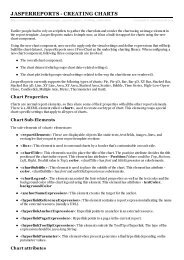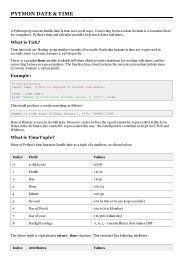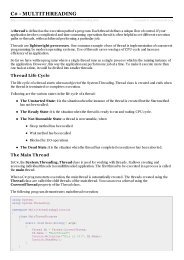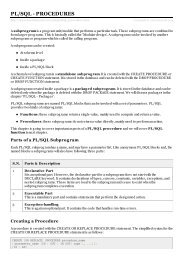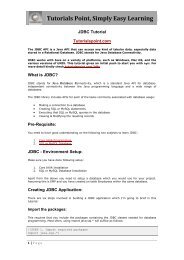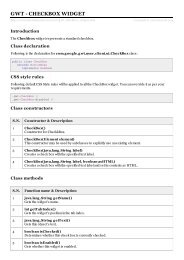Download Scala Tutorial (PDF Version) - Tutorials Point
Download Scala Tutorial (PDF Version) - Tutorials Point
Download Scala Tutorial (PDF Version) - Tutorials Point
You also want an ePaper? Increase the reach of your titles
YUMPU automatically turns print PDFs into web optimized ePapers that Google loves.
<strong>Scala</strong> Iterator Methods:<br />
Following are the important methods which you can use while playing with Iterator. For a complete list of methods<br />
available, please check official documentation of <strong>Scala</strong>.<br />
SN Methods with Description<br />
1<br />
2<br />
3<br />
4<br />
5<br />
6<br />
7<br />
8<br />
9<br />
10<br />
11<br />
12<br />
13<br />
14<br />
15<br />
16<br />
17<br />
def hasNext: Boolean<br />
Tests whether this iterator can provide another element.<br />
def next(): A<br />
Produces the next element of this iterator.<br />
def ++(that: => Iterator[A]): Iterator[A]<br />
Concatenates this iterator with another.<br />
def ++[B >: A](that :=> GenTraversableOnce[B]): Iterator[B]<br />
Concatenates this iterator with another.<br />
def addString(b: StringBuilder): StringBuilder<br />
Returns the string builder b to which elements were appended.<br />
def addString(b: StringBuilder, sep: String): StringBuilder<br />
Returns the string builder b to which elements were appended using a separator string.<br />
def buffered: BufferedIterator[A]<br />
Creates a buffered iterator from this iterator.<br />
def contains(elem: Any): Boolean<br />
Tests whether this iterator contains a given value as an element.<br />
def copyToArray(xs: Array[A], start: Int, len: Int): Unit<br />
Copies selected values produced by this iterator to an array.<br />
def count(p: (A) => Boolean): Int<br />
Counts the number of elements in the traversable or iterator which satisfy a predicate.<br />
def drop(n: Int): Iterator[A]<br />
Advances this iterator past the first n elements, or the length of the iterator, whichever is smaller.<br />
def dropWhile(p: (A) => Boolean): Iterator[A]<br />
Skips longest sequence of elements of this iterator which satisfy given predicate p, and returns an iterator of<br />
the remaining elements.<br />
def duplicate: (Iterator[A], Iterator[A])<br />
Creates two new iterators that both iterate over the same elements as this iterator (in the same order).<br />
def exists(p: (A) => Boolean): Boolean<br />
Returns true if the given predicate p holds for some of the values produced by this iterator, otherwise false.<br />
def filter(p: (A) => Boolean): Iterator[A]<br />
Returns an iterator over all the elements of this iterator that satisfy the predicate p. The order of the elements<br />
is preserved.<br />
def filterNot(p: (A) => Boolean): Iterator[A]<br />
Creates an iterator over all the elements of this iterator which do not satisfy a predicate p.<br />
def find(p: (A) => Boolean): Option[A]<br />
Finds the first value produced by the iterator satisfying a predicate, if any.<br />
TUTORIALS POINT<br />
Simply Easy Learning



